Step Back in Time: Dine in a 16th Century Windmill at Mesquida Mora, Mallorca!
If you’re heading to Mallorca and are interested in trying local wine, traditional snacks, and relaxing in the Mallorcan countryside, a trip to Mesquida Mora may just be for you.
Mesquida Mora is a biodynamic winery and 16th century windmill in Mallorca, and when the owner Barbara invited myself and a bunch of other bloggers to visit, we jumped at the chance.
After all, it’s not every day you get to drink wine in a windmill!
So, if you’re looking for a unique experience in Mallorca, or you’ve heard of Mesquida Mora and want to know whether it’s worth a visit, then just keep reading, because I’m about to tell you all about it.
Step Back in Time: Dine in a 16th Century Windmill at Mesquida Mora in Mallorca!
Mesquida Mora Mallorca – A Brief Introduction
Located close to the town of Porreres on the island of Mallorca, Mesquida Mora is owned and ran by Barbara, a fourth-generation winemaker who grew up on the vineyards and ran her family’s winery from 2004 until 2012.
In 2012, Barbara decided it was time for something new, and so Mesquida Mora was born, a project that Barbara prefers to view as her life project rather than a business.
Referring to herself as ‘CEO, manager, cleaner, winemaker and everything else,‘ Barbara’s approach is hands on to say the least, and it’s clear to anyone with eyes that this is a real passion project for her.
Barbara welcomed my fellow bloggers and I to one of her 8 plots of land (Mesquida Mora spans 20 hectares of land, all certified by the Balearic Ecological Agriculture Council and Demeter for organic and biodynamic viticulture), with open arms and immediately began telling us about her history as a winemaker, her futuristic vision with Mesquida Mora, and her passion for creating biodynamic wines.
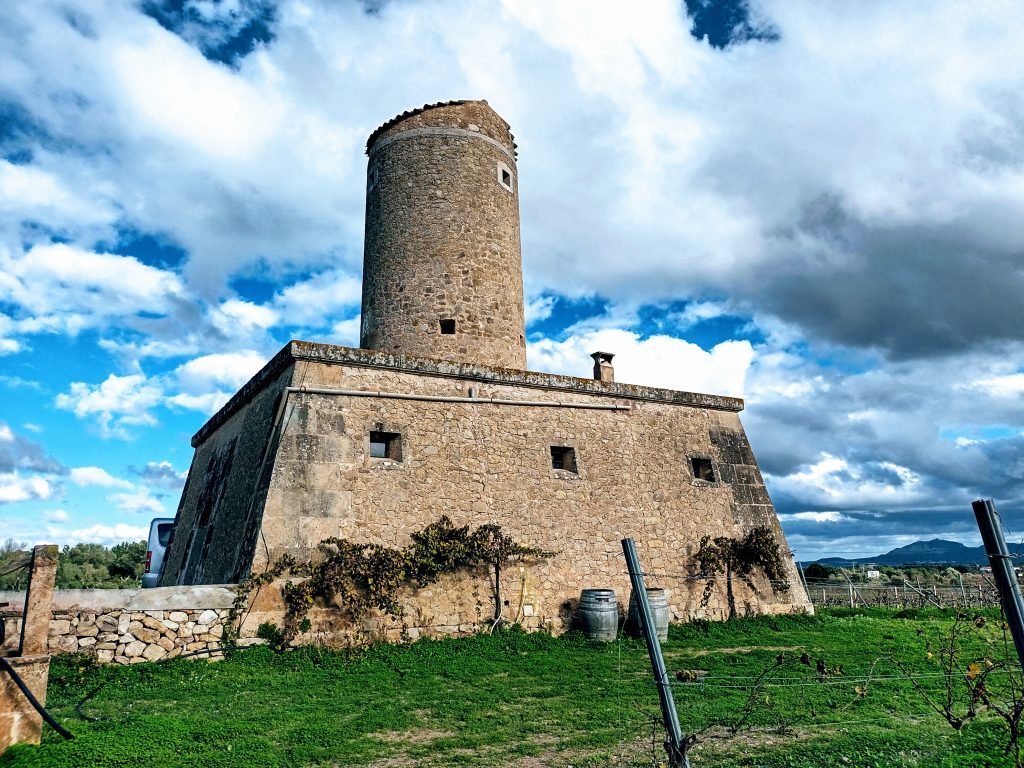
What are biodynamic wines?
Something that sets the wines from Mesquida Mora apart from other Mallorcan wines is the fact that they are biodynamic.
The process of making biodynamic wine is an alternative form of viticulture that takes a spiritual, ethical and ecological approach.
It views the vineyard as one solid organism, with each element being connected and equally as important as one another.
For example, Barbara is most passionate about the soil on her land, and she told us how soil has provided food for hundreds of years to countless humans and animals, and so we have a duty to respect it and care for it.
This is part of the reason why she recently planted over 100 fruit trees – by adding to the biodiversity, she is contributing to the regeneration of the soil, ensuring that the vineyard will eventually be passed down to her daughter in a better condition than she found it in.
Biodynamic winemaking also does not involve the use of chemical sprays, pesticides or fertilisers, as these things can damage the soil. Instead, natural composts and fertilisers are used.
A biodynamic approach also takes spiritual factors such as astrology and lunar activity into account!
The more Barbara talked, the more animated she became, and when she told us that she had been passionate about organic and biodynamic viticulture for over 20 years, it was clear that she wasn’t exaggerating.
But do biodynamic wines taste different?
Of course!
When you drink a biodynamic wine, you are getting a true reflection of what the grapes have produced, without anything synthetic manipulating the flavour in order to appeal to the masses.
It is for this reason that some people may find biodynamic wines a little strange at first.
They tend to have a stronger aroma and taste fuller and fruiter than conventional wines.

The Wine at Mesquida Mora
Before we ventured inside the beautiful 16th century windmill to actually try some wine, Barbara told us a bit more about her personal approach to the art of winemaking, as well as explaining the reasons why behind things are the way they are at Mesquida Mora.
First, Mesquida Mora only produces 85 – 90 thousand bottles of wine each year.
This is because Barbara has very few people working for her and she wants to keep everything completely under her control, again stressing the point that this is a passion project for her rather than a commercial enterprise.
Barbara’s family have been making wine in Mallorca since 1945, and her parents were actually the first people to bring foreign grape varieties such as Merlot, Cabernet and Chardonnay to the island.
However, as Barbara is so proud of her homeland and its produce, she always combines these grapes with indigenous Mallorcan varieties such as Prensal, Callet, Manta Negro, Giró Blanc, and Gorgollasa, giving Mesquida Mora wines a unique Mallorcan twist.
None of the grapes used in Mesquida Mora’s wine are purchased from suppliers, all being grown under the close supervision of Barbara.
When you visit Mesquida Mora, you really get the feeling as though you are being introduced to Barbara’s wine rather than just ‘another winery’s wine.’
A Traditional Mallorcan Lunch and Wine Pairing
If you visit Mesquida Mora, Barbara will host you and provide you with a traditional Mallorcan lunch/dinner inside the windmill, as well as a wine pairing with some of her favourite wines.
A local village woman prepares all the food from scratch, and on this occasion, Barbara explained that we would be trying a variety of traditional Mallorcan foods, as well as two of her favourite wines.
Apologetically, she told us that we would usually be able to try more wine, but a mildew illness in 2020 meant that her 2021 wines were just not ready at the time of our visit.
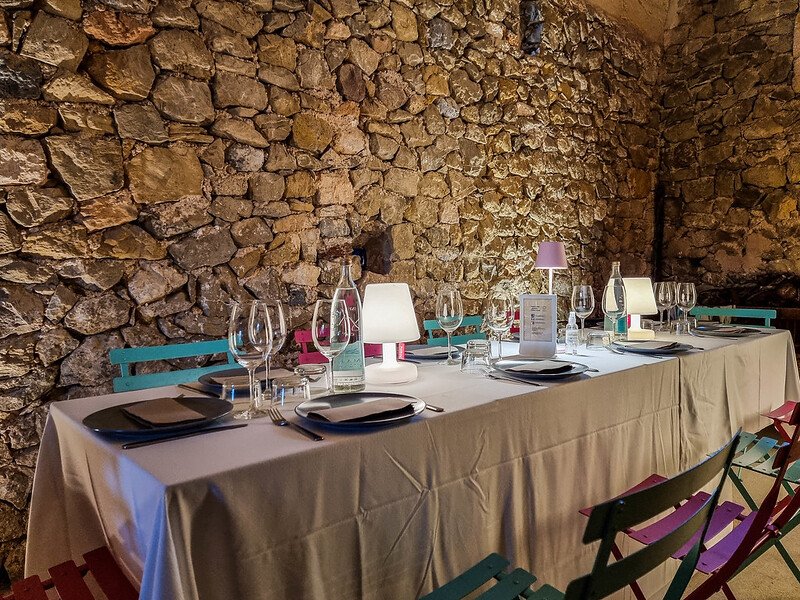
IMG courtesy of Joanna from The World in My Pocket
First up was the Sincronia Negre, a red wine that blends six different grapes, of both local and foreign varieties.
It is a light and fruity wine with a slight spice, and very easy to drink.
With the Sincronia came some classic Mallorcan snacks.
First, little panadas (panada Mallorquina).
Panada Mallorquina are little round pies that look and taste very similar to the classic British pork pie.
With thick pastry lined with lard (for extra crispiness!) and a filling of pork and green peas, they are super tasty (they can also be filled with lamb at Easter time, and sometimes sobrasada is added for extra tastiness).
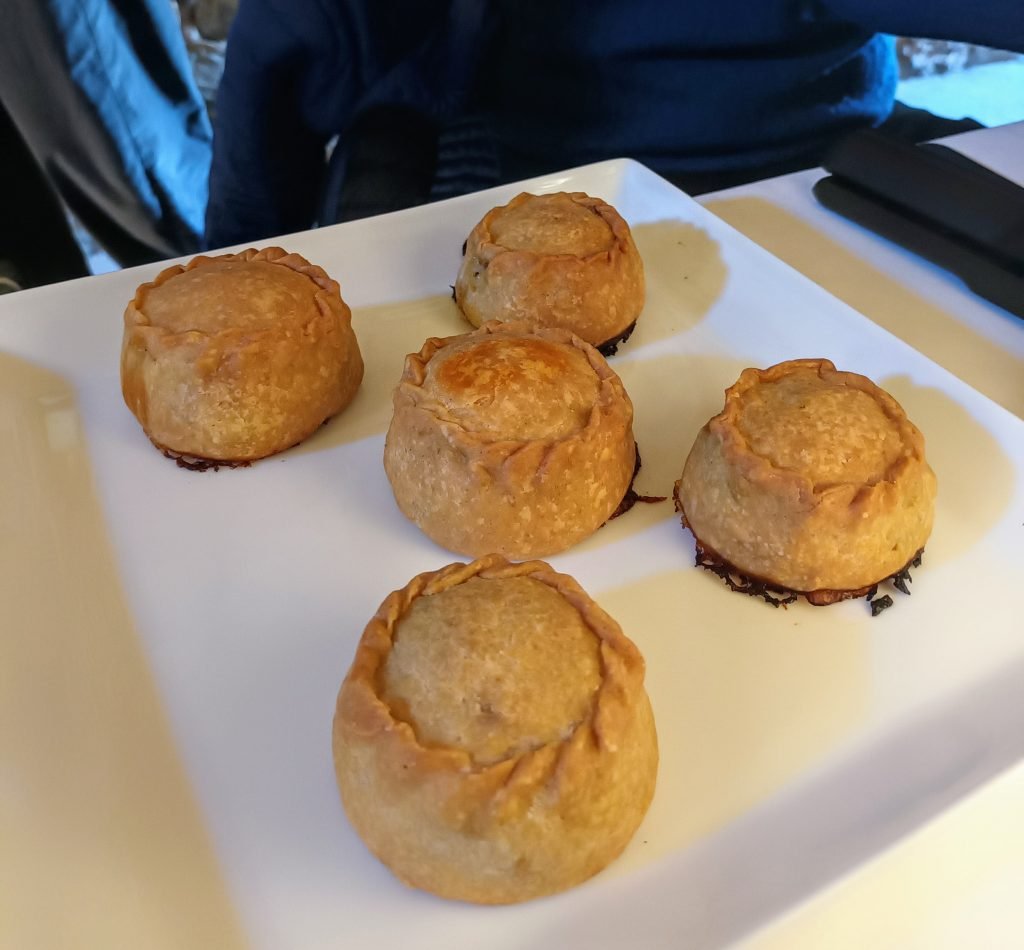

We also enjoyed some tortilla, the traditional Spanish omelette made with potato and onion and served at room temperature.
Living in Valencia, I love tortilla, and so I was really happy when these plates came out!

Our next wine was the Trispol 2019, which translates to ‘the floor.’
The reason behind the name is that when Barbara began her project, she had the vineyards, but nothing else, not even a ceiling nor a floor (Barbara produces another wine named Sotil, meaning ‘ceiling!’).
Using Callet, Syrah and Cabernet grapes, Trispol is a full-bodied wine that lingers on the palette, with notes of spicy red fruits, vanilla and cocoa.
To accompany the wine, we were introduced to Coca Mallorquina, a kind of hard Spanish flatbread which can be topped with a variety of things before being baked in the oven.
We tried four different varieties – spinach and codfish, a typical ‘coca de trempó’ which is a salad made with chopped onions, red bell peppers and tomatoes, fig and caramelised onion, and roasted yellow and red bell peppers with pork.
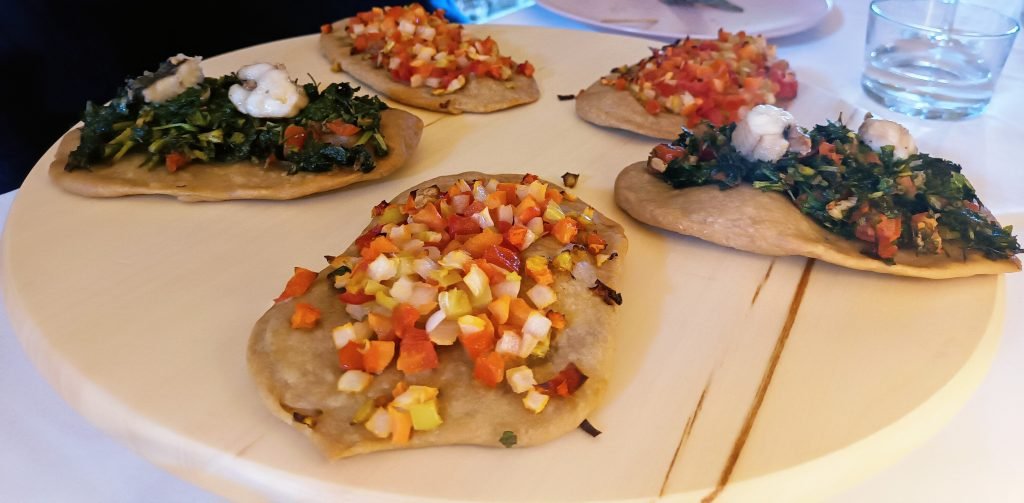
We also tried some cocarrois, little half-moon shaped pastries stuffed with vegetables (cabbage, cauliflower, and spinach are most popular), and seasoned with pine kernels and paprika.
Cocarrois are kinda like a vegetarian version of panada.

Next on our foray into Mallorcan food was something very unique – a cremadillo de bacalao.
Now, I consider myself to be a pretty adventurous eater.
I’ve tried crickets in Vietnam, spleen and lung sandwiches in Sicily, tripe soup in Poland, and a whole host of other weird and wonderful delicacies from around the world.
The cremadillo de bacalao, a sweet and flaky pastry with caramelised sugar and stuffed with salted codfish and red pepper did not do it for me.
Nope. I’m sorry.
Salted cod inside sweet pastry is just not for me, although I will say that everybody else seemed to like it.

Our final savoury dish was a large bowl of pilotes, small meatballs made from minced pork and beef and cooked in a tomato and herb sauce, flavoured with bacon and sobrasada, and served with hunks of thick crusty bread.
This dish was hearty, meaty, and the kind of thing that warms up your soul from the inside out.
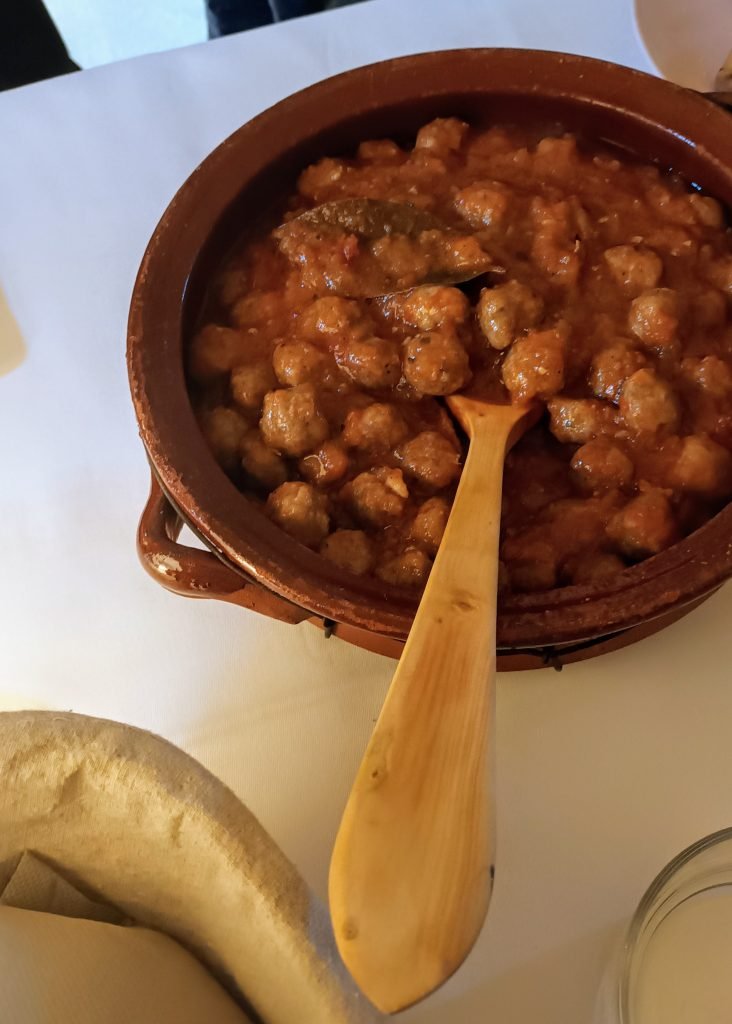
Of course, it helped that Barbara kept coming around to top up our glasses when she saw we were getting low!
When we’d finished mopping up the sauce with our bread, Barbara cleared the plates and brought out our dessert – cremadillos dolces, sweet pastries filled with either chocolate cream or apricot jam (not codfish, thank god!), as well as bowls of fresh oranges and almond nuts.
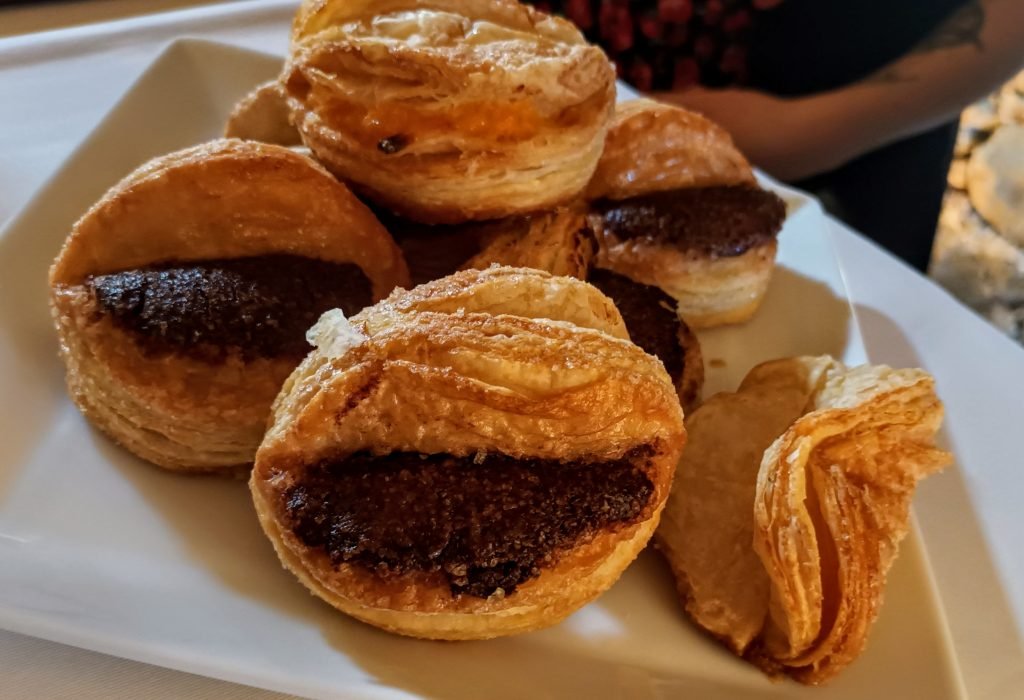
Mesquida Mora Mallorca | Final Thoughts
I really enjoyed our lunch at Mesquida Mora with Barbara’s favourite wines, and can honestly say that Barbara’s futuristic vision of winemaking and passion for what she does, shines through more than any other winemaker I’ve met.
The windmill is simply beautiful, inside and out, and the selection of foods that we tried was varied and delicious, not to mention the wines!
If you want to enjoy a lunch and wine pairing at Mesquida Mora, you can visit their website here.
Barbara opens specifically for her bookings and every lunch is a private affair (meaning you will have the whole place to yourself), so she asks for a minimum of 8 and a maximum of 20 people per booking.
If you are a smaller group and still want to visit, it’s worth getting in touch anyway to see what Barbara can do – if she happens to have another small group interested then she can host both parties.
So, that’s about it for today but as always, if you have any questions, please let me know in the comments below and I will get back to you!
Until next time,
XOXO
If you liked this article and would like to support my work, please click the button above to donate a couple of bucks and buy me a coffee. The ad revenue that I receive on this website is minimal, so support from my readers enables me to keep creating content that you (hopefully!) love to read.
